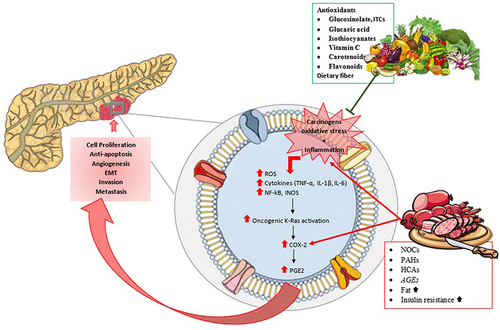Figures & data
Table 1 The Search Strategy Summary
Table 2 Summarization of the Studies on Trace Minerals and PC
Figure 1 Carcinogens, oxidative stress and inflammation can trigger inflammatory pathways that promote cell proliferation, anti-apoptosis, angiogenesis, epithelial-to-mesenchymal transition (EMT), invasion and metastasis. The presence of antioxidant nutrients (carotenoids and vitamin C), dietary fiber, and other phytochemicals (eg, flavonoids) provide a potential explanation for the protective effect of fruits and vegetables on PC by preventing the carcinogens, oxidative stress, and inflammation which initiate cancer pathogenesis. Cruciferous vegetables specifically have other potent antioxidants such as glucosinolate, indole-3-carbinol (ITCs), glucaric acid, and isothiocyanates. On the other hand, mechanisms that link red or processed meat to pancreatic carcinogenesis, include by-products of cooking methods such as polycyclic aromatic hydrocarbons (PAHs), heterocyclic amines (HCAs), N-nitroso compounds (NOCs), advanced glycation end-products (AGEs), increased fat intake, and insulin resistance.

